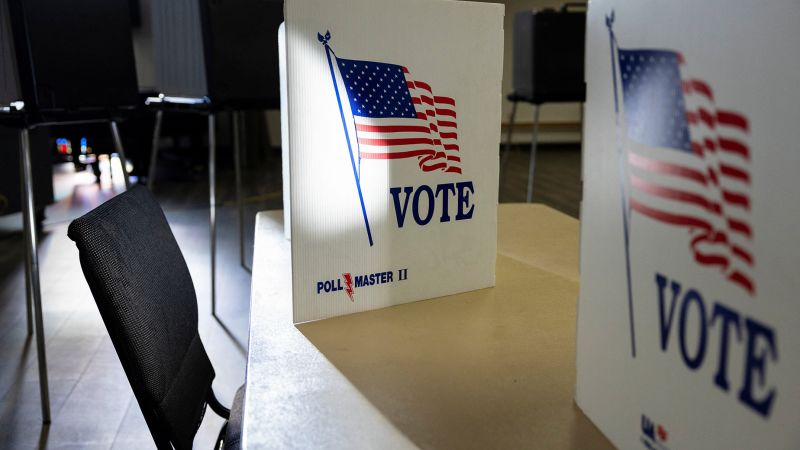After losing the 2020 election, former President Donald Trump has championed the baseless lie that the results were tainted by widespread fraud.
To fix this made-up problem, Trump has proposed a four-part solution: The US should switch exclusively to paper ballots, require proof of citizenship to register to vote, require voters to show ID at the polls, and eliminate mail-in voting by holding the entire election in-person on just one day.
Policymakers can debate the merits of forcing voters to prove their citizenship and provide ID. And mail-in voting, widely used by both Democrats and Republicans, isn’t going anywhere.
But Trump’s comments on “paper ballots” have puzzled voting experts and election officials – because almost all voters nationwide already use paper ballots.
Facts First: Trump’s insistence that the US switch to “paper ballots” is nonsensical. More than 98% of voters live in jurisdictions that produce fully auditable paper trails, according to data from Verified Voting, which tracks election equipment in every county.
Trump brings up his four-part proposal almost every time he speaks about election integrity. He has mentioned the “paper ballots” claim dozens of times this year alone.
“We’re going to fix our elections so that our elections are going to be honorable and honest, and people leave, and they know their vote is counted,” Trump said at an August rally in Potterville, Michigan. “We are going to have free and fair elections. And ideally, we go to paper ballots, same-day voting, proof of citizenship – very big – and voter ID.”
In an interview last month, Trump said one way to “solve this problem” of mass fraud was to “go to paper ballots.” At a rally in Johnstown, Pennsylvania, he said, “we want to go to paper ballots.” And he said, “we want paper ballots,” in Montezuma Pass, Arizona.
Verified Voting, a nonpartisan group, has spent the past two decades urging counties to move away from paperless voting in favor of in-person polling sites. (Vote-by-mail obviously incorporates a paper trail.) The people who run the group say they have accomplished their goal – despite claims from Trump and others that the US still needs paper ballots.
“It’s really weird and I don’t understand it,” said Mark Lindeman, the group’s director for policy and strategy. “Almost everybody votes on paper ballots. Anyone who is convinced that we need paper ballots is very likely voting on paper ballots themselves.”
Only about 1.4% of registered voters live in counties where there’s no paper trail of their ballot if they vote in-person, according to Verified Voting’s data. (If they vote-by-mail, then there is a paper trail.) These holdouts are the entire state of Louisiana and a few Texas counties.
For everyone else, there are paper trails that can be checked during a post-election audit or recount.
Nearly 70% of registered voters live in counties where voters physically mark their choices on a paper ballot.
Another 25% of voters live in counties that use “ballot-marking devices,” where voters use a touchscreen or another interface to select their candidates, and then the machine fills out a paper ballot to reflect their selections.
The remaining 5% of voters use electronic machines that record votes directly into the computer’s memory. But even most of these machines now create paper trails, too. The holdout counties in Texas and the entire state of Louisiana only store the votes on the computer memory.
The share of voters in “paperless” counties has been steadily shrinking with every election cycle over the past 20 years, according to Verified Voting.
Sherry Poland, elections director in Hamilton County, Ohio, which includes Cincinnati, said her county switched to hand-marked paper ballots in 2006, and that the system creates a “backup” and “redundancy” that should inspire confidence in the integrity of the process.
“The trend is coming back now and everyone is realizing the value of having a paper trial,” said Poland, a Republican.
After the 2016 election, battleground states like Pennsylvania and Georgia transitioned away from paperless machines and now use systems with paper trails. And since 2020, Tennessee and many counties in New Jersey, Texas, and Mississippi made the switch too.
False and nonsensical claims about election procedures have had a negative impact on voter perceptions on the integrity of US elections, especially among Republicans.
A majority of Trump supporters in Michigan, Arizona, and Pennsylvania now say they’re “not at all confident” or only “just a little” confident the results will be accurately tallied in their state, according to recent CNN polling. And one in five of Trump supporters said in a recent ABC/Ipsos poll that they aren’t prepared to accept the results of the election.
“Twenty years ago, Verified Voting was founded to get rid of paperless (voting machines),” Lindeman said.
“And now we’ve just about made it. We’re wondering why everybody isn’t happier.
We’ve done this incredible thing together as a country.”



